Grammatophyllum - culture sheet
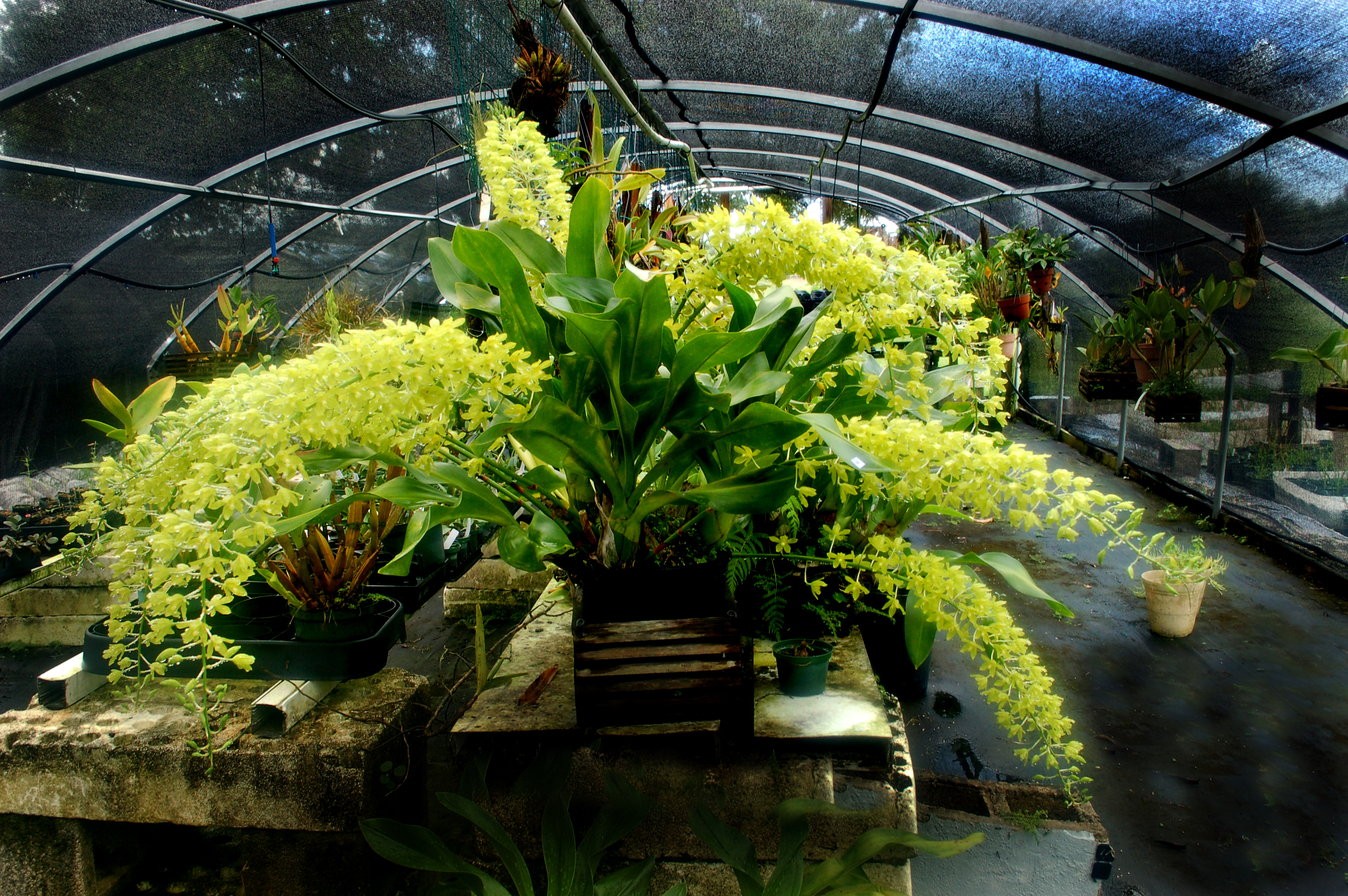 This still a young plant with 1000 flowers about 5 1/2 feet wide
This still a young plant with 1000 flowers about 5 1/2 feet wide.
These are easy to grow
if given enough water and fertilizer. They increase in size rapidly if re-potted into larger containers. Be aware, that like all orchids they only have so much strength per year for growing and flowers. Re-potting rapidly will make larger plants faster but possibly will cause the plant to skip flowering for a year. They have a tendency to drop leaves if grown too cool over the winter, but recover rapidly when growing season starts. They like high sunlight to set flowers. Flower inflorescences will normally have 80-100 flowers from 3-4 inches each. One AOS awarded plant had 32 inflorescences and 3670 flowers.
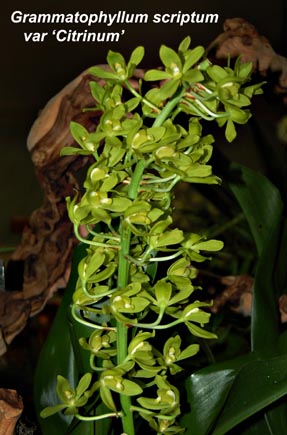
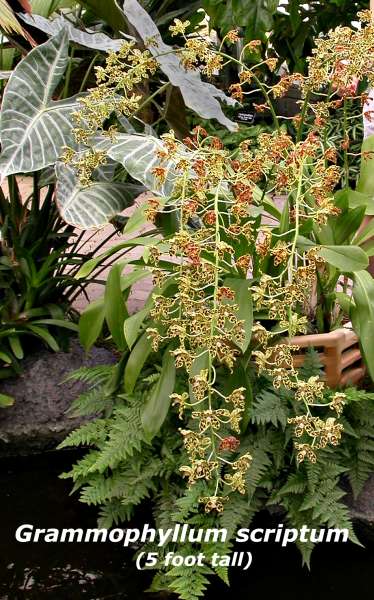
Gram scriptum var citron is a light lemon green without any markings (left photo). The type form of scriptum is the leopard pattern. (right photo)
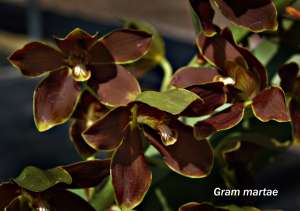 Gram. Matae is solid mahogany.
Gram. Matae is solid mahogany.
Gram scriptum var Kiilani is a newly introduced miniature. It flowers with the same coloration as its big brother
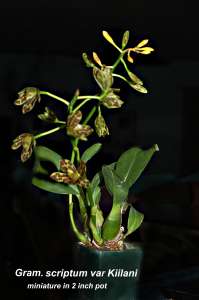
and yet seldom gets over 10 inches and flowers in a two inch pot.
You have to look close at the comparison photo on the right. The Kiilani is hardly bigger than the height of the basket. It is in front of the basket

Grammatophyllum have several unique growing characteristics. They drop leaves when cold but they grow back rapidly. The can be grow to specimen size rapidly with enough water, fertilizer, light and frequent re-potting into larger pots.
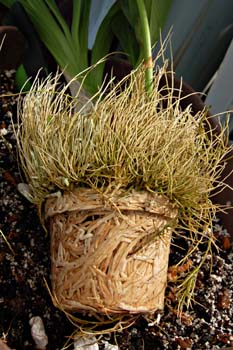
They are very unique in that they have two distinct types of roots for different purposes.
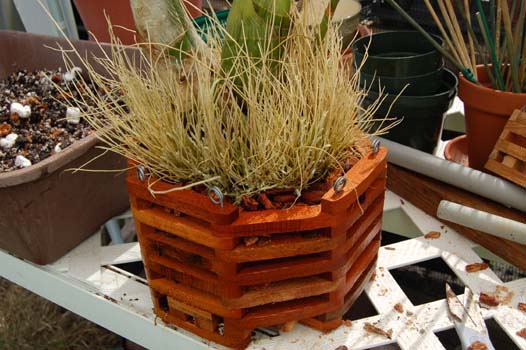
The thick normal roots grow down into the medium and function like any other orchids' roots. The thinner hairy roots that grow up should never be forced into the medium. In the wild their purpose is to catch debris such as leaves and as the debris decomposes it feeds the plant.
The roots grow so fast it is not necessary to untangle the thick roots before re-potting. It is probably impossible to do anyway.
We like potting in baskets as they are more stable than pots and the thin roots will grow out the side and up. Do not trust the hock on normal hangers as they will straighten under the weight and drop your plant. Baskets can be placed on a table similar to a pot without a hanger .
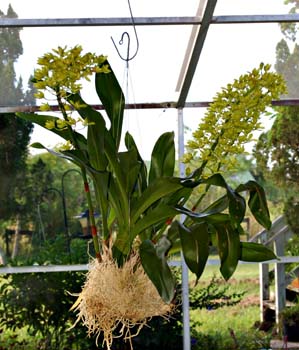
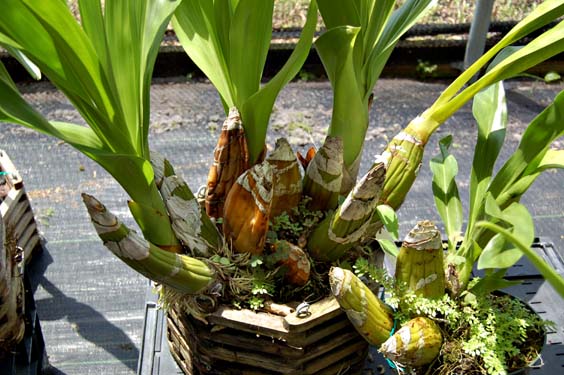
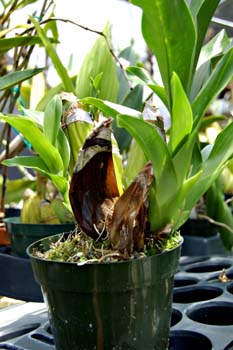
Another unique characteristic is that in order to grow larger the plant will discard old pseudobulbs that have lost their leaves. Most orchids do this but Grammatophyllum will also discard center bulbs. They do this by the bulb turning brown and rotting rapidly. ( photo above and right) The important point is to know this is natural and not worry the plant is dying. The pseudobulb will get soft and if squeezed stick of rot. Unlike other orchids the rot will not spread to the healthy parts of the plant. If left alone, the rot will dry into a papery shell. (right photo) It then can easily be removed or if left it will decompose and feed the plant. (bottom photo)
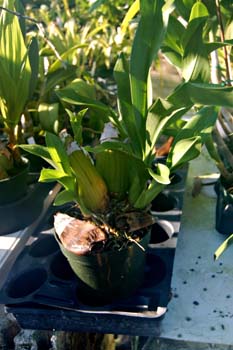





 Gram. Matae is solid mahogany.
Gram. Matae is solid mahogany.  and yet seldom gets over 10 inches and flowers in a two inch pot.
and yet seldom gets over 10 inches and flowers in a two inch pot.

 The thick normal roots grow down into the medium and function like any other orchids' roots. The thinner hairy roots that grow up should never be forced into the medium. In the wild their purpose is to catch debris such as leaves and as the debris decomposes it feeds the plant.
The thick normal roots grow down into the medium and function like any other orchids' roots. The thinner hairy roots that grow up should never be forced into the medium. In the wild their purpose is to catch debris such as leaves and as the debris decomposes it feeds the plant. 

 Another unique characteristic is that in order to grow larger the plant will discard old pseudobulbs that have lost their leaves. Most orchids do this but Grammatophyllum will also discard center bulbs. They do this by the bulb turning brown and rotting rapidly. ( photo above and right) The important point is to know this is natural and not worry the plant is dying. The pseudobulb will get soft and if squeezed stick of rot. Unlike other orchids the rot will not spread to the healthy parts of the plant. If left alone, the rot will dry into a papery shell. (right photo) It then can easily be removed or if left it will decompose and feed the plant. (bottom photo)
Another unique characteristic is that in order to grow larger the plant will discard old pseudobulbs that have lost their leaves. Most orchids do this but Grammatophyllum will also discard center bulbs. They do this by the bulb turning brown and rotting rapidly. ( photo above and right) The important point is to know this is natural and not worry the plant is dying. The pseudobulb will get soft and if squeezed stick of rot. Unlike other orchids the rot will not spread to the healthy parts of the plant. If left alone, the rot will dry into a papery shell. (right photo) It then can easily be removed or if left it will decompose and feed the plant. (bottom photo)